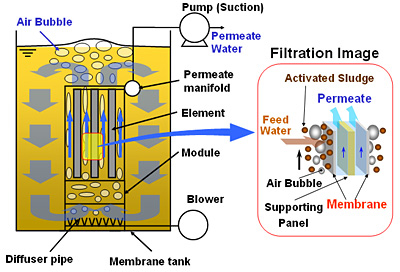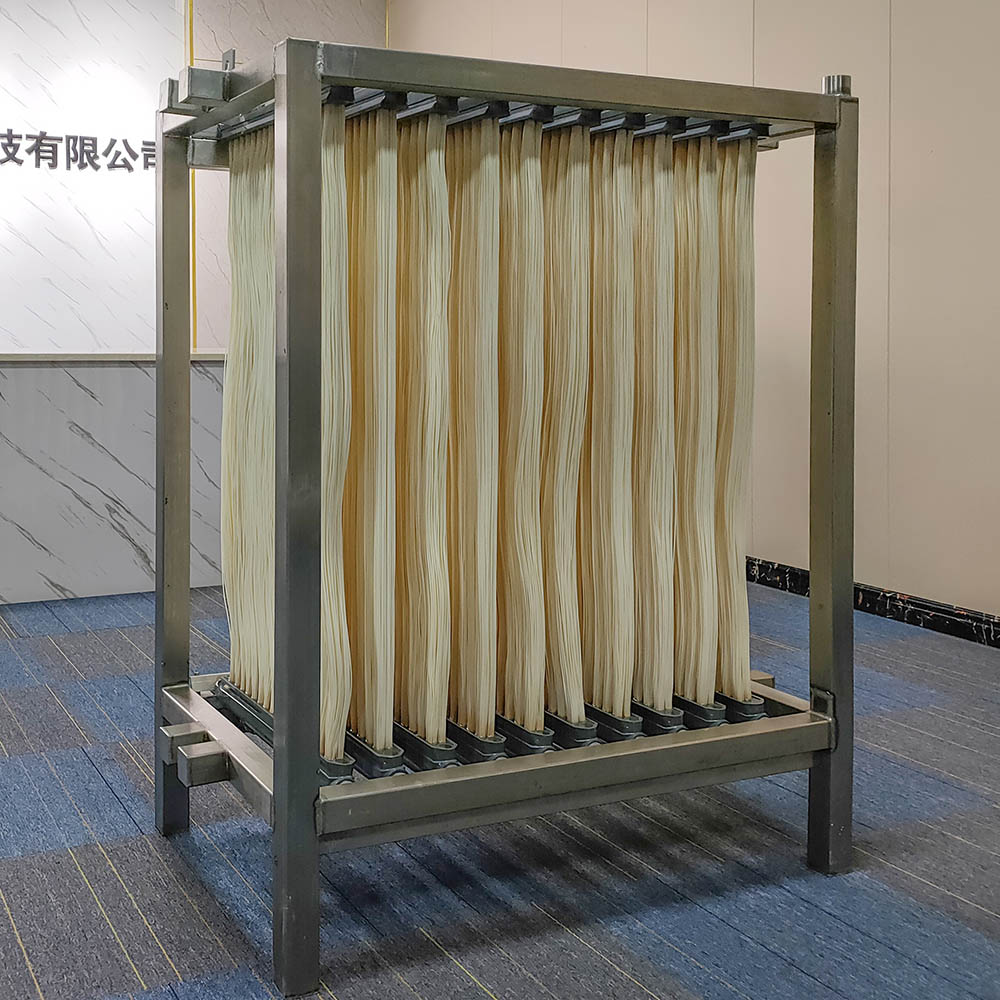How Membrane Bioreactor Can Improve the Quality of Wastewater Treatment
How Membrane Bioreactor Can Improve the Quality of Wastewater Treatment
Blog Article
Understanding Membrane Bioreactors: The Future of Wastewater Treatment
Membrane bioreactors (MBRs) stand for a notable development in the field of wastewater therapy, integrating biological procedures with advanced membrane filtering to enhance effluent high quality. As global water scarcity and strict regulative frameworks end up being significantly pushing problems, MBR modern technology provides a reliable response via its capacity to lessen impact and maximize source healing.
What Are Membrane Bioreactors?

The core parts of MBR systems include a bioreactor where microbial activity occurs and a membrane unit that filterings system the mixed alcohol. This double capability allows the synchronised degradation of raw material and solid-liquid splitting up in a solitary action. MBRs can run in both immersed and exterior configurations, with immersed systems being extra typical because of their portable design and functional performance.
The adoption of MBR innovation has actually gotten traction in different applications, varying from community wastewater treatment to industrial effluent administration. MBRs are specifically helpful in circumstances where space is restricted or stringent effluent quality requirements have to be satisfied. By maintaining a high focus of bacteria within the bioreactor, MBRs improve the deterioration of natural toxins, thus generating higher treatment efficiencies compared to traditional techniques.
Secret Advantages of MBR Technology
The combination of organic therapy with membrane filtration in MBR systems supplies numerous benefits that establish it aside from typical wastewater treatment approaches. One of the main advantages is the enhanced effluent high quality. MBRs effectively eliminate put on hold microorganisms and solids, achieving higher degrees of filtration that meet rigid discharge criteria and help with water reuse applications.

One more substantial benefit is the reduced sludge production. MBR systems generate less excess sludge, causing reduced disposal prices and a decline in ecological impact. The closed nature of the membrane system lessens the threat of smell exhausts and enhances overall process control.
Lastly, MBRs are versatile and adaptable, making them suitable for various wastewater types, including commercial and metropolitan resources. The capacity to incorporate with innovative therapy modern technologies better boosts their performance, making MBRs an encouraging option for the future of wastewater administration.
Difficulties and Limitations of MBRs
While MBR innovation provides various benefits, it additionally encounters a number of difficulties and restrictions that can impact its widespread fostering. One considerable difficulty is the high capital and functional prices related to MBR systems. The preliminary investment for membrane layer materials and the necessary framework can be significant, making it less accessible for smaller sized industries or districts.
Furthermore, membrane fouling continues to be an essential problem that can diminish system performance and increase upkeep needs. Fouling occurs when solids, raw material, or bacteria accumulate on the membrane layer surface, leading to minimized permeability and calling for frequent cleansing or substitute.
Another restriction involves the intricacy of the technology. MBR systems need experienced personnel for operation click here now and upkeep, which can be an obstacle in regions with limited technological know-how. The disposal of invested membrane layers offers environmental worries, as the products are frequently not biodegradable and can add to throw away management challenges.
Last But Not Least, while MBRs can effectively treat a variety of wastewater, they may not be suitable for all applications, specifically those with high focus of fats, oils, and oils, requiring further research and technology to deal with these constraints.
Applications of Membrane Bioreactors
In numerous industries, membrane bioreactors (MBRs) have emerged as a versatile service for wastewater therapy (Membrane Bioreactor). Their applications span community, industrial, and farming setups, showcasing their flexibility and efficiency in varied environments. In community wastewater treatment plants, MBRs substantially boost effluent quality, permitting for water reuse and lowering the environmental impact of released wastewater
Industrially, MBRs are employed in food and drink handling, fabric manufacturing, and pharmaceutical manufacturing, where they efficiently deal with high-strength waste streams. Their capacity to take care of varying lots and varying contaminant concentrations makes them especially important in these markets. Furthermore, MBRs promote the elimination of microorganisms, suspended solids, and organic matter, adding to conformity with strict discharge policies.
In agriculture, MBRs are increasingly used for dealing with agricultural drainage and animals wastewater, allowing the recovery of nutrients for plant food manufacturing. They likewise aid in the therapy of greywater for irrigation, advertising lasting water management practices.
The convenience of MBRs is additional evidenced by their assimilation with other technologies, such as anaerobic food digestion and advanced oxidation processes, improving overall efficiency and resource recuperation in wastewater treatment systems.
The Future of Wastewater Therapy
Improvements in technology and an expanding emphasis on sustainability are forming the future of wastewater treatment. Membrane layer bioreactors (MBRs) exhibit why not find out more this shift by incorporating biological therapy processes with membrane layer filtering, causing top notch effluent suitable for reuse. The pattern towards circular economies is triggering centers to embrace MBRs for their capacity to recuperate sources, such as water and nutrients, from wastewater.
Developments in membrane layer materials and setup are enhancing the effectiveness and long life of MBR systems, decreasing functional prices and energy usage. Smart modern technology combination, consisting of real-time surveillance and automated control systems, is further maximizing performance and allowing anticipating maintenance, thus lessening downtime.
Moreover, societal expectations and regulative stress are pressing sectors and towns to embrace even more lasting techniques. Membrane Bioreactor. The change towards decentralized wastewater treatment services is getting grip, enabling local therapy that reduces transportation costs and energy usage
Verdict
Membrane layer bioreactors (MBRs) stand go to my blog for a transformative strategy to wastewater treatment, integrating biological processes with advanced membrane technology. The advantages of MBRs, including enhanced effluent quality, reduced spatial requirements, and lower sludge manufacturing, position them as a viable service amid growing urbanization and stricter ecological laws. Regardless of existing obstacles, the ongoing advancement in membrane layer materials and operational strategies promises to strengthen the efficiency and adoption of MBRs, ensuring their critical duty in the future of sustainable wastewater administration.
Membrane layer bioreactors (MBRs) stand for a significant advancement in the field of wastewater therapy, integrating organic processes with advanced membrane filtration to improve effluent high quality.Membrane layer bioreactors (MBRs) incorporate biological treatment processes with membrane layer filtering to effectively treat wastewater.The combination of biological therapy with membrane layer filtering in MBR systems provides numerous benefits that establish it apart from standard wastewater therapy methods. Membrane layer bioreactors (MBRs) exemplify this shift by incorporating organic treatment procedures with membrane layer filtration, resulting in high-quality effluent appropriate for reuse.Membrane layer bioreactors (MBRs) represent a transformative technique to wastewater therapy, incorporating organic procedures with sophisticated membrane layer technology.
Report this page